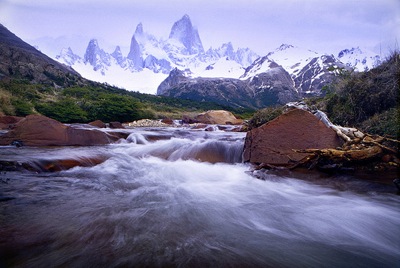
By Fabian Bedne
Years ago my wife and I visited northern Patagonia. We spent a week in the town of Bariloche and also took a couple of trips. One trip was a tour that took us to Chile by hopping from boat to bus to boat and so on, all the while we were getting higher and higher in the Andes and getting more and more in the middle of nowhere - extremely beautiful and cool.
On one of the legs of this trip we happened to overhear English being spoken by a nearby couple - obviously angry. And as I looked I noticed that the couple, both enveloped with brand new Eddie Bauer luggage and clothing, needed my help. They were obviously tourists that were way over their heads trying to argue something with the ship’s staff. I walked ever to them and offered my assistance. They were a couple of New Englanders traveling through Patagonia. They spoke no Spanish and were mad because their travel agent had “lied” to them.
They wanted to travel to Chile using a tour their agent had sold them, but had just learned that the trip only took them to the border of Argentina and Chile and back. There was a way to go from the border on into Chile, but it was accessible a couple of days later. The couple was in complete and utter disbelief that they had been sold a package that was not workable. They had to make it to Chile in time to make connections in Santiago. They were very angry and upset that this was all wrong, and they were insistent that a tourist agent should be held responsible and should not lie to you.
I tried to explain that in Argentina things were different, that the expectations for doing business were not the same, and that they should finish the trip that day, return to Bariloche and redo the same trip in a couple of days. But they refused to listen. What they knew and believed about how the world worked was what was real to them. They believed they were entitled to their rights - the right to make a complaint, to expect redress and to get what they paid for. They were forced to continue on a trip through the lakes and their anger made the trip worse and worse. We arrived at our destination, a beautiful alpine looking resort by a lake surrounded by snowy mountains. They continued to be angry and were really annoyed that no payphone was available anywhere to make their complaints and new travel arrangements. Later they asked me to translate their requests with the border soldiers to find out if they could rent a car. But no car was available and they wanted to know if they could walk or pitch a tent, but that wasn’t possible as the way down the mountain was extremely hard. Finally they asked me to ask the Chilean military if they could spend the night in their post, the answer was that the woman could but not the man. I couldn’t tell if the border police were joking, but in any case that attitude and suggestion changed the minds of the New Englanders, and they agreed to go back to Bariloche as I had suggested. Unfortunately, they were still so angry that all during the rest of the trip they completely missed the amazing beauty of the place they were in.
I spent a good part of that day trying to understand why even after I explained the situation to them they refused to believe it. When I took a second look I saw that they were holding on tight to what they knew of how the world was supposed to work – that provided a sense of security for them. This is what they knew how to do. Yet, this was still surprising to me given that they were on a trip to explore the world and have new experiences.
As I see the immigration debate progressing in the USA, I feel like I am in that boat again. I see people extrapolating their beliefs and life experience and assuming that it applies to people all over the world.
The idea that you can “demagnetize” a place, that you can make things so hard for somebody that comes from the worst places on earth so that they will move on is so disingenuous, it is like expecting a payphone in the middle of the Andes.
Most Immigrants are not just moving to a new place casually. It is not like making the choice I did or so many Americans make to move from Ohio to Tennessee to be closer to family or to find a better job. These immigrants leave family and friends behind and face all kind of hardship both economic physical. They do so because there is nothing else to do to survive. The options at home may include death, sickness, living in shanty towns with no utilities, torture, brutality and all the results of extreme poverty, totalitarianism and isolation. And because life is so extremely hard back home there is nothing that anybody could possibly do that will make them turn around and go back. The worst of the worst situations in the USA is better than many of these folks could ever hope for in their own countries.
Making things hard for Immigrants only makes life harder for everybody. Immigrants already know how hard life is. Let's work on positive solutions that benefit everybody.



 Photo by Dietmar Temps. Licensed under Creative Commons.
Photo by Dietmar Temps. Licensed under Creative Commons.

No comments:
Post a Comment